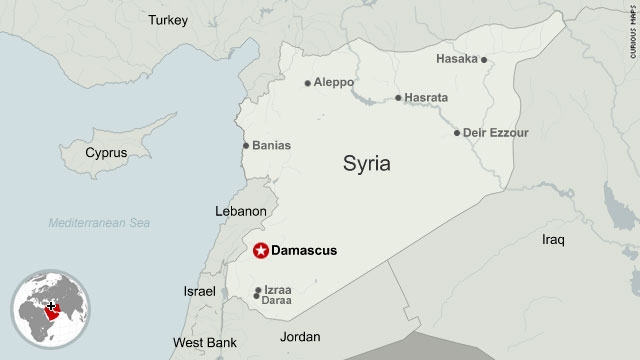Henry Kissinger once said: "The Arabs can't make war without Egypt; and they can't make peace without Syria." It was a back-handed tribute to Syria's consistently hard line against Israel and its critical geographical position in what Israeli Prime Minister Benjamin 

Netanyahu calls "a rough neighborhood."
A generation later, Kissinger's words hold true -- but in a suddenly different context. What happens in Syria sends waves, not ripples, far beyond its borders. And what Syria lacks in population and economic clout it more than makes up for as a regional crossroads -- bordering Lebanon, Israel, Iraq, Jordan and Turkey.
Instability in Syria, its descent into civil war or the overthrow of President Bashar al-Assad would all provide opportunities for the regime's adversaries -- but also great risks.
The United States would welcome the prospect of the Syrian-Iranian alliance being broken, and with it their joint sponsorship of the Lebanese Shiite militia, Hezbollah. There might be the chance of movement toward peace with Israel (though surely not in the chaotic short term).




RELATED TOPICS
But there would also be the risk of communal violence in Syria quickly spreading to Lebanon, which has similar sectarian fault-lines, the possibility of a resurgent Islamist tendency and the export of instability to Iraq and even Turkey.
Over the decades former President Hafez al-Assad and now his son Bashar have burnished their credentials with the Arab "street" by sponsoring hard-line opponents of Israel and resisting a peace treaty (unlike Egypt and Jordan.) In part, it has been a device to bolster the regime's legitimacy.
In a country where Sunni Muslims make up the majority, the regime is dominated by the Alawite minority, which make up about 12% of the population.
"You have to be very closely linked to the beliefs of the people," the younger al-Assad told the Wall Street Journal in January. "When there is divergence between your policy and the people's beliefs and interests, (it) creates disturbance," he said.
Those comments may sound ironic today, but for decades the policy has made Syria the flag-bearer for "pan-Arab" confrontation with Israel.
So it is that Syria has been a sanctuary for the leadership of the Palestinian group Hamas, which runs Gaza and is branded by the United States as a terrorist organization. Khaled Mashaal, the head of Hamas' political bureau, lives in Damascus.
And the Syrian alliance with Iran has changed the balance of power in the Middle East. Last year in Tehran, Bashar al-Assad called the bond "unbreakable." Between them, the two governments have equipped and funded Hezbollah. And not only has Hezbollah become a major player in Lebanon's politics; it has tens of thousands of rockets and missiles pointing in Israel's direction from southern Lebanon, according to U.S. diplomats.
Syria has also been a conduit for Tehran to exercise broader influence in the region, much to the chagrin of conservative Sunni-dominated regimes in Egypt, Jordan and Saudi Arabia. In one U.S. diplomatic cable from 2009 obtained by WikiLeaks, the then-intelligence chief in Egypt, Omar Suleiman, claimed that his agency had begun "recruiting agents in Syria and Iran" in retaliation for their alleged use of Hezbollah cells in Egypt. A few months later, then-President Hosni Mubarak told U.S. Gen. David Petraeus that Syria had sabotaged a deal that would have led to the release by Hamas of the Israeli soldier Gilad Shalit.
Under al-Assad the younger, Syria has continued to play a crucial role pulling political strings in its smaller neighbor Lebanon, It no longer has troops there; they were withdrawn in 2005 amid huge street protests that followed the murder of former Lebanese Prime Minister Rafik Hariri.
But earlier this year, Damascus maneuvered to topple Hariri's son Saad as prime minister by persuading one of its old enemies, Druze politician Walid Jumblatt, to abandon the government. That left Hezbollah as the kingmaker in protracted negotiations to form a new government, while the Sunni community felt frozen out. The tenacity of the Syrian regime should not be underestimated.
Syria is also influential in Iraq. U.S. officials long accused the Syrian authorities of allowing the porous border with Iraq to be used by insurgents to reach Iraq, an accusation Damascus vehemently denied.
For a while, the Iraqi government also suspected that Syria was behind terrorist attacks. A U.S. diplomatic cable from 2009 quoted Iraqi Prime Minister Nouri al-Maliki as telling the U.S. ambassador that both Iran and Syria were providing weapons to insurgents in Iraq. At one point, the two countries recalled their envoys in a spat about alleged Syrian support for sabotage in the region.
Given this litany of alleged "meddling," some analysts (and a few local rivals) believe that ousting al-Assad would help rid the region of many of its ills. But what might follow instability in Syria or the downfall of al-Assad?
Syria is more a geographic confection than a natural state. When the Ottoman Empire collapsed at the end of the First World War, the rump Syria was created -- a mixed bag of religions, sects and tribes.
The delicate sectarian balance between the majority Sunnis and the minority but very powerful Alawites means that any implosion of the state could be quickly followed by Iraqi-style warfare.
Syria also has sizeable Kurdish, Christian and Druze minorities, all of which have their own grievances and anxieties. Some analysts believe it is the fear of anarchy that has so far restrained many people in Damascus and Syria's second city, Aleppo, from joining the protests -- their anxiety being "Apres Assad, la deluge."
There is also the fear -- especially among Syrian Christians -- of Islamist groups taking advantage of the situation. Hafez al-Assad had a simple answer to a previous uprising (in Hama in 1982) by the Muslim Brotherhood: repression on a scale that would bear comparison with Saddam Hussein. An estimated 20,000 people may have been killed in that uprising, according to human rights groups. The current government has alleged that "Salafists" are behind protests in some Syrian cities -- and some Syrians who support the regime point out that many of the protests have been in "conservative" areas.
A statement from the coalition of 14 local committees claimed Friday the government was deliberately stoking such fears. "This government is based on lies ... They are gambling with our national unity by playing sectarian, ethnic and religious divisions against each other." But few would dispute such divisions exist.
Any "deluge" would not be confined to Syria. Similar fault-lines run through Lebanon. Were a Sunni-dominated government to take power in Damascus, the Sunnis of Lebanon might feel emboldened to challenge the fragile status quo there. There are already signs they believe Hezbollah is suddenly and unexpectedly weaker.
Sensing revenge, Lebanon's caretaker Prime Minister Saad Hariri recently challenged Hezbollah's right to be an armed "state within a state" undermining Lebanon's sovereignty. The Syrians are already nervous that some parties in Lebanon may stir the pot next door. In ominous tones, Syria's ambassador in Beirut, Ali Abdel Karim Ali, warned that "If any harm comes to Syria, then Lebanon will be harmed."
There are also great stakes here for Turkey. A vocal Kurdish community in Syria might not be welcome across the border, where Turkey has long had its own issues with Kurdish rights. Turkey has encouraged Bashar al-Assad to embrace reform in order to stabilize the situation. It has no desire to see a Levantine Yugoslavia on its southern border.
"Turkey is potentially one of the most significant foreign factors to influence Syria, either playing a role in helping save the regime from its own excesses, or helping save the Syrian people from their predicament," writes Rime Allaf of the think tank Chatham House in London, which focuses on international affairs. Either way, Turkey's regional influence -- already growing thanks to its economic strength -- would be further burnished.
To Patrick Seale, author of a biography of Hafez al-Assad and perhaps pre-eminent among experts on Syria, the stakes are enormous. "If the regime fails to tame this domestic unrest," he wrote in Foreign Policy, "Syria's external influence will inevitably be enfeebled. ... As the crisis deepens, Syria's allies tremble. Meanwhile, its enemies rejoice."
It's not clear that Iran is yet trembling, although U.S. officials say it is offering Damascus advice on how to stifle the protests. But Iranian Nobel Peace Prize laureate Shirin Ebadi believes Tehran is not immune from its ally's woes.
"The democratization of one country will impact that of another country. Syria, the only ally of Iran and puppet of Iran, is a dictatorship where power is inherited," she said last week. "If Syria becomes democratic, it will be as if the arms of Iran are cut off. Naturally that will help the democratic movement of Iran."
But even its enemies are apprehensive about what might follow. Israel would of course welcome problems for Hamas and Hezbollah. But the Assads have at least guaranteed a stable border (despite saber-rattling rhetoric). They are "the devil you know." The prospect of Islamists gaining greater influence in Syria, or a sectarian meltdown, are not better alternatives, says Israeli officials.
The dilemma for the regime itself is that any further concessions -- certainly any that would allow effective opposition parties and freedom of association -- could be akin to signing its own death warrant. Stifled by 40 years of the Assad dynasty, the protesters have given voice to widespread frustration over corruption, the pervasive power of the mukhabarat (security forces) and economic hardship worsened by mismanagement and drought.
Some commentators also ask whether such concessions would be tolerated by regime insiders, the security chiefs and "state entrepreneurs" who have done well through endemic corruption. Robert Kaplan, author of the book "Eastward to Tartary," says al-Assad doesn't have much room for maneuver. "To a much greater degree than his father, the son is trapped within a web of interest groups that include a corrupt business establishment and military and intelligence leaders averse to reform," he wrote in Foreign Policy.
For now, al-Assad appears ready to take a much harsher approach to try to stamp out the protests. The promise of reform, most recently uttered in his Wall Street Journal interview, has been at best put on hold. The idea of a Damascus Spring -- the modernization and liberalization of Syria -- is in cold storage.
For the United States, the rapidly unfolding events on the streets of Syria pose a dilemma. Harsher measures against the regime, including sanctions and more active support for the opposition, might help topple al-Assad. But equally they might drive him more firmly into the Iranian embrace.
Patrick Seale concludes: "The United States would be wise to spend a little less time thinking about Libya and a little more time thinking about a state that truly has implications on U.S. national interests." If things go south in Syria, he says, "the entire region could be consumed in an orgy of violence."
No comments:
Post a Comment